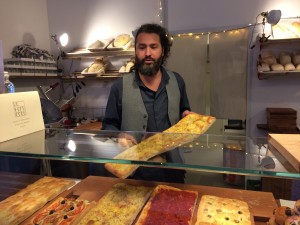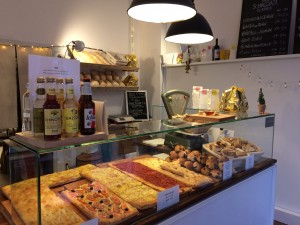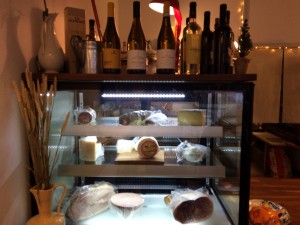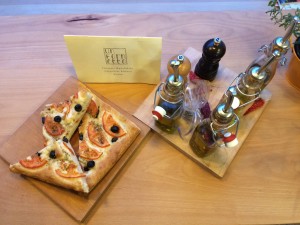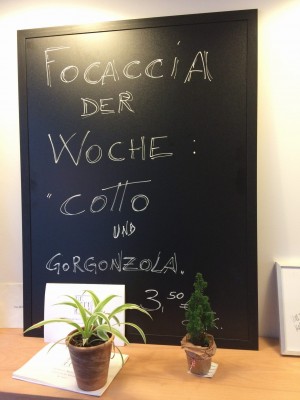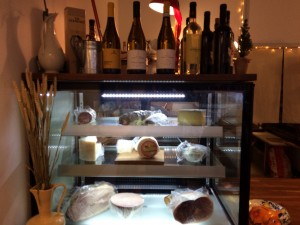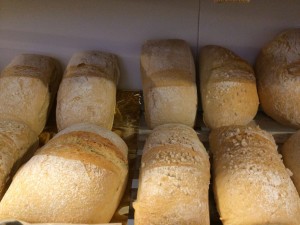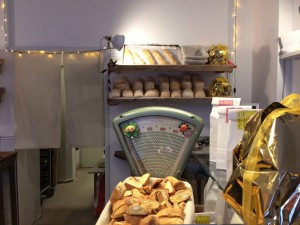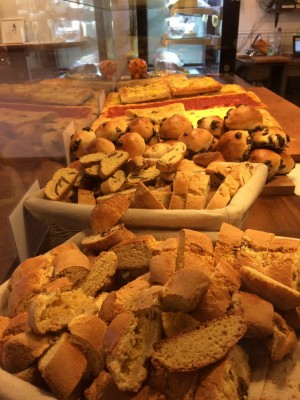FOR ITALIAN VERSION SRCOLL DOWN
Walking through streets of Berlin‘, it often occurs that you have to avoid knocking into tables, signs and trestles positioned at the center of the sidewalks to attract locals and tourists to taste specialities of the most varied world cuisines. There is an impressive number of cafés, snack bars and proper restaurants offering a typical and hearty northern European breakfast, a warm and invigorating lunch in the cold seasons, as well as refined dinner menus. In short, for those who want to try out new dishes or simply to eat out with friends, you are spoiled for choice. For those, instead, who want to have a snack or eat a frugal meal, you must rely on one of the many kiosks selling falafel, kebab, pizza slices or burgers and french fries.
It was from this starting point that Ettore, a nice Sicilian who grew up in Tuscany, came up with the idea to open un fornetto, a small and delicious bakery that re-proposes typical tastes and aromas from the Bel Paese.
Ettore wanted to offer an alternative quality to the many Imbiss in the city. It is no coincidence considering the characteristics of his wares that he decided to open this small piece of Italy precisely in Prenzlauer Berg.
A triumph of delicious red pizzas or focaccia studded with green olives
Born as a working class neighborhood and with a high concentration of Mietkasernen (literally „rent barracks“ – large buildings for intensive residential use, anonymous and uniform), until the Wall fell, Prenzlauer Berg was one of the poorest neighborhoods in Berlin.
Long neglected and left in the same conditions in which it „survived“ the bombardments of the Second World War, Prenzlauer Berg was for years an artistic, political and intellectual laboratory where punk movements and opposition to the DDR were developed.
Since the mid-eighties, following a remarkable recovery and rehabilitation effort, it has gradually transformed into one of the city’s most chic and sought-after neighborhoods. The houses occupied by artists and dissidents have slowly given way to small offices, ever-less alternative and increasingly sought-after shops, to many kindergartens and playgrounds for children that can be found on every street corner. In this setting of rebirth and well-being, un fornetto was very well received by the locals. Framed in white and hanging inside a large window where you can see into the interior, un fornetto’s sign invites you to try ’schiacciata, cantucci e vino’. Even when you cross the threshold, the room is white with wooden furniture. There is no eccentric note that can steal the scene from the schiacciata (Tuscan name for the best known focaccia), cold cuts or cantucci (typical biscuits from Prato).
The large counter in the middle of the room is a triumph of delicious red pizzas, focaccia covered with potato, focaccia studded with green olives or simply with oil, to be filled with savory meats and cheeses. Small brioche, cantucci with almonds, figs or pieces of chocolate are always on display. On the walls, resting on the shelves, there are the shapes of typical unsalted Tuscan bread.
Jovial and smiling atmosphere
In short, homegrown delicacies that have nothing in common with those that are passed off as pizzas slices by Arab restaurateurs or with packaged cantucci that you can be found in the supermarkets. The recipes come from the same bakery that one of the owners of un fornetto found more than twenty years ago in Florence. These are ancient recipes that have been handed down for generations. Even the selection of wines, coming both from the South and North of Italy, seems to satisfy different palates and, for those who have never tried it, there is also the possibility of tasting some good Tuscan Vin Santo. In addition to the quality of the products, the thing that makes un fornetto a special place is the jovial and smiling atmosphere.
Ettore, the big man behind the counter, puts the customers at ease with his congeniality, his openness of spirit and his kind ways. They laugh at his jokes and as often happens in Italy, they feel welcome in a familiar scene. For those who stay to consume at the table, to see Ettore in action is like watching an exhilarating sketch!
Un fornetto Wörther Str. 24, 10405 Berlin
Camminando per le strade di Berlino, capita spesso di dover driblare tavoli, insegne e cavalletti posizionati al centro dei marciapiedi per attirare locali e turisti a gustare specialità delle più svariate cucine del mondo.
Si tratta di un numero impressionante di caffè, tavole calde o di veri e propri ristoranti che offrono dalla tipica e abbondante colazione nord europea al pranzo caldo e corroborante delle stagioni fredde, fino a ricercati menu per la cena. Insomma, per chi abbia voglia di sperimentare nuovi piatti o semplicemente di mangiar fuori con gli amici, c’è solo l’imbarazzo della scelta. Per chi, invece, vuole fare uno spuntino o consumare un pasto fugale, non resta che affidarsi a uno dei tantissimi chioschi che vendono falafel, kebap, tranci di pizza o hamburger e patatine. È stato proprio partendo da questa considerazione che Ettore, un simpatico siciliano cresciuto in Toscana, ha avuto l’idea di aprire un fornetto, un delizioso panificio che ripropone gusti e profumi tipici del Bel Paese. Ettore voleva offrire un’alternativa di qualità ai tanti imbiss presenti in città. Non è un caso, considerate le caratteristiche della sua offerta, che abbia deciso di aprire questo piccolo pezzetto d’Italia proprio a Prenzlauer Berg.
Un tripudio di gustosissime pizze rosse o di focacce tempestate da olive verdi
Nato come quartiere operaio e con un’alta concentrazione di Mietkasernen (letteralmente “caserme d’affitto” – grandi fabbricati di natura intensiva a uso abitativo, anonimi e massificanti), fino alla caduta del Muro, Prenzlauer Berg era uno dei quartieri più poveri di Berlino. A lungo trascurato e lasciato nelle condizioni in cui era ‘sopravvissuto’ ai bombardamenti della seconda Guerra Mondiale, Prenzlauer Berg per anni è stato tuttavia un laboratorio artistico, politico e intellettuale dove si sono sviluppati movimenti punk e di opposizione alla DDR. Dalla metà degli anni ’80, a seguito di una notevole opera di recupero e risanamento, si è progressivamente trasformato in uno dei quartieri più chic e ricercati della città. Le case occupate da artisti e dissidenti hanno lentamente lasciato il posto a piccoli uffici, a negozietti sempre meno alternativi e sempre più ricercati, a tantissimi asili e ai parchi giochi per bambini che sorgono a ogni angolo di strada. In questa cornice di rinascita e benessere, un fornetto è stato molto ben accolto dagli abitanti del posto.
In una cornice bianca e una grande vetrina che consente la vista dell’interno, l’insegna di un fornetto invita a provare ‘schiacciata, cantucci e vino’.
Anche varcata la soglia il locale si presenta bianco con i mobili in legno. Nessuna nota eccentrica che possa rubare la scena alle schiacciate (nome toscano della meglio conosciuta focaccia), ai salumi o ai cantucci (tipici biscotti pratesi). Il grande banco al centro della sala è un tripudio di gustosissime pizze rosse, di focacce ricoperte da patate, tempestate da olive verdi o semplicemente all’olio, da imbottire con saporitissimi salumi e formaggi. Sempre in bella mostra ci sono piccole brioche, cantucci con mandorle, con fichi o con pezzi di cioccolato. Alle pareti, poggiati su delle scansie, ci sono le forme del tipico pane sciapo toscano.
Un posto speciale è l’atmosfera gioviale e sorridente
Insomma prelibatezze nostrane che nulla hanno in comune con quelle che vengono spacciate per pizze a trancio da ristoratori arabi o con i cantucci confezionati che si trovano nei supermercati.
Le ricette sono le stesse del panificio che uno dei soci proprietari di un fornetto, ha rilevato più di vent’anni fa a Firenze. Si tratta di antiche ricette che vengono tramandate da generazioni. Anche la selezione dei vini, provenienti tanto dal sud che dal nord Italia, sembra soddisfare i diversi palati e, per chi non l’ha mai provato, c’è anche la possibilità di assaggiare del buon Vin Santo toscano. Oltre alla qualità dei prodotti, a rendere un fornetto un posto speciale è l’atmosfera gioviale e sorridente. Ettore, l’omone dietro al bancone, con la sua simpatia, la sua prontezza di spirito e i suoi modi gentili, mette a proprio agio la clientela che si diverte alle sue battute e, come accade spesso in Italia, si sente accolta in un clima familiare.
Per chi si ferma a consumare al tavolo, vedere Ettore in azione sarà un esilarante siparietto!

